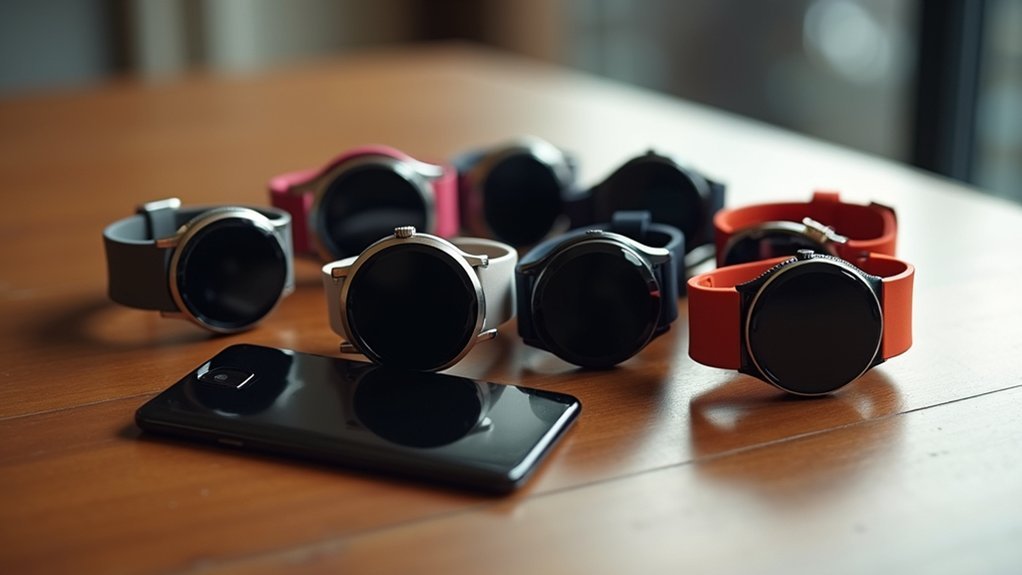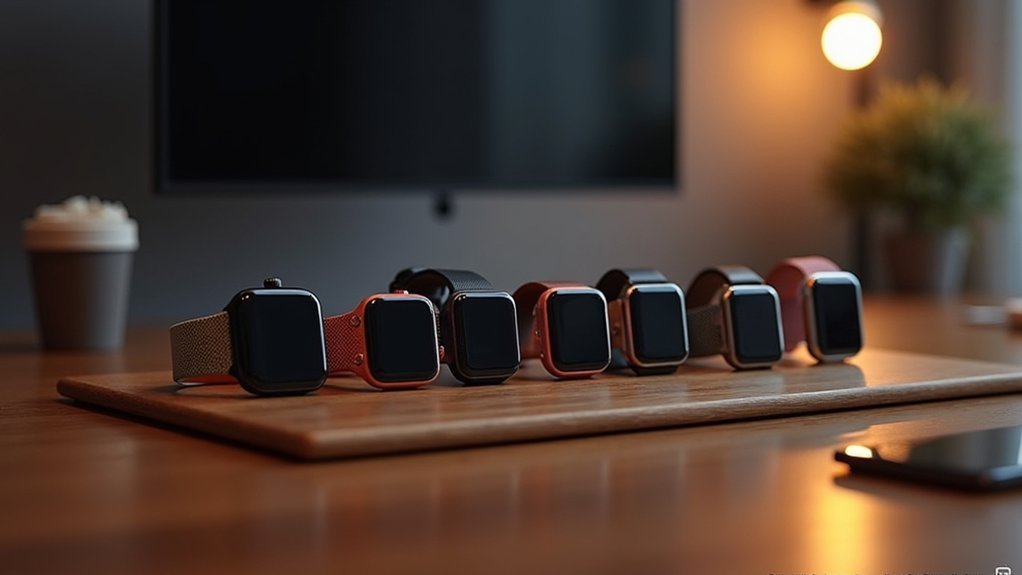When choosing an ECG smartwatch, prioritize models with FDA clearance or CE marking for medical accuracy. Guarantee compatibility with your smartphone and look for additional health features like SpO2 and sleep tracking. Consider battery life (aim for 24+ hours) and comfort for daily wear. Top options include Apple Watch Ultra 2, Samsung Galaxy Watch, and Garmin fēnix 7 Pro. The right device will balance accurate heart monitoring with features that match your lifestyle needs.
Understanding ECG Technology in Smartwatches

Electrocardiogram (ECG) technology in smartwatches represents a revolutionary advancement in personal health monitoring.
Unlike clinical 12-lead ECGs, your smartwatch uses a single electrode sensor, typically located on the watch’s underside, to detect electrical impulses from your heart muscle contractions.
Smartwatch ECGs capture heart activity using a single sensor, offering simplified monitoring compared to complex clinical equipment.
When you place your finger on the watch’s sensor, it creates a circuit that captures your heart’s electrical activity. The device’s algorithms then analyze this data to identify patterns and detect irregularities like atrial fibrillation (AFib). These algorithms typically achieve 70-90% accuracy depending on factors like signal quality and user physiology.
While smartwatch ECGs can’t replace thorough medical tests, they excel at providing convenient, on-demand heart rhythm monitoring.
You’ll receive immediate feedback about your heart rhythm, potentially alerting you to issues that warrant medical attention. This technology empowers you to take a more active role in monitoring your cardiovascular health.
Top-Rated ECG Smartwatch Models in 2023
The market offers five standout ECG smartwatches in 2023, each balancing health monitoring capabilities with everyday usability. When choosing your device, consider both health features and compatibility with your smartphone ecosystem. Withings devices include sophisticated health monitoring capabilities and received FDA clearance in October 2021.
| Brand | Top Model | Key Features |
|---|---|---|
| Apple | Watch Ultra 2 | 60+ workout modes, blood oxygen tracking, iOS only |
| Samsung | Galaxy Watch | Multiple sizes, LTE options, works with Android |
| Garmin | fēnix 7 Pro | Solar options, robust outdoor features, cross-platform |
For budget-conscious shoppers, the Fitbit Sense 2 provides extensive health monitoring at a lower price point. Meanwhile, Asus’s VivioWatch 6 Aero introduces innovative blood pressure monitoring alongside ECG functionality. Compare battery life carefully, as continuous health monitoring can greatly impact performance.
Medical Accuracy and Regulatory Certifications

While features and compatibility guide your smartwatch selection, understanding the medical reliability behind these devices matters just as much.
Look for smartwatches with FDA clearance and CE marking, as these certifications confirm the device meets established safety standards.
FDA clearance and CE marking aren’t just buzzwords—they’re your assurance that a smartwatch meets rigorous safety standards for health monitoring.
The best ECG smartwatches achieve sensitivity and specificity rates of 90-95% for atrial fibrillation detection, though they’re still less accurate than traditional 12-lead ECGs.
Apple Watch, for instance, demonstrates 94.8% sensitivity in AFib detection. The Apple Watch ECG app shows impressive accuracy with 99.3% specificity for sinus rhythm and 98.5% sensitivity for Afib detection.
Consider how algorithms affect accuracy—more sophisticated AI integration typically means better reliability.
Remember that external factors like movement and proper wear position can impact signal quality.
For serious medical conditions, always use these devices as supplementary monitoring tools rather than primary diagnostic instruments.
Essential Health Monitoring Features Beyond ECG
Modern smartwatches offer far more than just ECG capabilities, creating an all-encompassing health monitoring system right on your wrist.
Look for continuous heart rate monitoring with high sampling rates that track your pulse during rest, activity, and recovery phases. Blood oxygen (SpO2) monitoring provides essential insights into respiratory health and can detect issues like sleep apnea.
Comprehensive sleep tracking analyzes your sleep stages and quality, while activity monitoring tracks everything from steps to estimated VO2 max.
The best devices also include stress monitoring through heart rate variability analysis, helping you identify when to take mindful breaks. Some advanced smartwatches can even detect irregular heartbeats and send alerts when abnormal patterns are detected.
When choosing an ECG smartwatch, consider which additional health features align with your specific wellness goals and existing health concerns for the most valuable daily insights.
Comfort, Battery Life and Daily Usability Factors

Long-term comfort and seamless integration into your daily routine ultimately determine whether an ECG smartwatch becomes a valuable health companion or just another unused gadget. Consider how lightweight and ergonomic designs prevent wrist fatigue during continuous wear. Taking regular ECG recordings requires active participation from users to properly monitor heart rhythm irregularities.
| Feature | Why It Matters | What to Look For |
|---|---|---|
| Comfort | Affects monitoring consistency | Lightweight, hypoallergenic materials |
| Battery Life | Determines monitoring duration | 24+ hours, quick charging |
| Water Resistance | Supports everyday activities | IPX7 or higher rating |
| Interface | Impacts ease of use | One-touch ECG, intuitive controls |
| Ecosystem | Expands functionality | Smartphone compatibility, third-party apps |
When evaluating daily usability, look for devices with minimal interaction required to start ECG recordings and clear battery status indicators. Adjustable, breathable straps will greatly improve long-term wearing comfort, especially during sleep tracking or exercise.
Frequently Asked Questions
Can ECG Smartwatches Replace Professional Medical ECG Tests?
No, smartwatches can’t replace professional ECG tests. They use only one lead versus medical ECGs’ twelve, limiting diagnostic capabilities. They’re useful for monitoring but you’ll need medical follow-up for any abnormal findings.
Are ECG Readings Accurate When Exercising or Moving?
No, your ECG readings aren’t accurate when exercising. Movement creates artifacts that reduce signal quality, with accuracy declining markedly above 150 bpm. For reliable readings, you’ll need to remain relatively still during measurement.
Will Insurance Cover the Cost of an ECG Smartwatch?
Most insurance won’t cover ECG smartwatches. You’ll typically pay out-of-pocket unless your doctor prescribes it for a specific medical condition. Some private insurers offer partial coverage through wellness programs, but it’s rare.
Can Children or Elderly Users Effectively Operate ECG Smartwatches?
You’ll find that elderly users can effectively operate ECG smartwatches with simple interfaces and voice assistance, while children typically need adult guidance to understand proper technique and interpret results correctly.
How Often Should I Take ECG Readings for Preventive Monitoring?
For preventive monitoring, you should check ECGs monthly or quarterly if you’re healthy, weekly if you have risk factors, and daily only if prescribed. Always take readings when experiencing symptoms like palpitations or dizziness.
In Summary
When choosing an ECG smartwatch, consider both your health needs and lifestyle. Look for FDA-cleared devices that offer thorough monitoring beyond ECG. Don’t compromise on comfort for all-day wear, and make sure battery life meets your usage patterns. Remember, these watches complement but don’t replace professional medical care. The best option balances accurate health tracking with features you’ll actually use daily.





Leave a Reply